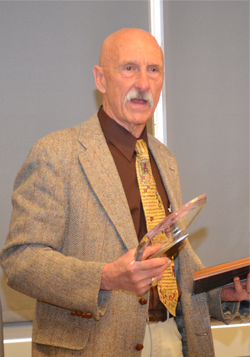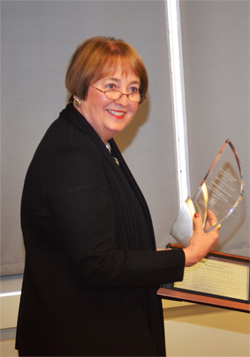Napierkowski, Shockley-Zalabak honored by Faculty Council
University of Colorado Colorado Springs Chancellor Pam Shockley-Zalabak and UCCS English professor Tom Napierkowski were this year’s honorees of the CU Faculty Council, which presented both educators with awards on April 25 at the council’s final meeting of the academic year.
Shockley-Zalabak, also a professor of communication, received Administrator of the Year. Napierkowski, who teaches in the College of Letters, Arts and Sciences and who earned his doctorate at CU-Boulder, received the Distinguished Service Award.
Shockley-Zalabak was recognized for 37 years of service to UCCS, including the last 12 years as chancellor. The resolution presented by the council noted that she “has championed and modeled shared governance on the University of Colorado Colorado Springs campus and across the University of Colorado system.”
“I do still consider myself a member of the faculty,” she told the council in receiving the award, noting that she has continued to teach and write during every semester of her chancellorship.
Napierkowski was recognized for more than 40 years as a member of the faculty, including 20 years serving on the Faculty Senate Committee on Privilege and Tenure and four terms as president of the UCCS Faculty Senate and Faculty Assembly. He also has spent 15 years working with the UCCS Educational Policy and University Standards (EPUS) Committee, often as chair.
“I believe with a passion that universities are, or should be, places of reasoned discourse … governed with reason and civility,” he said in receiving the award. “I try to do that and I know you do, too.”
The awards were presented by Faculty Council Chair Melinda Piket-May, who was re-elected as chair for the next academic year. Also elected were Laura Borgelt, vice chair, and Christina Martinez, secretary. All three ran unopposed and were voted in by acclamation.
The council also voted to support the recommendations of its EPUS Committee on four systemwide Administrative Policy Statements currently under review by university leaders. Among them is APS 7008, Student Behaviors of Concern, which outlines the university’s requirement for each campus to establish a Behavioral Review and Intervention Team, and provides institutional guidelines for policies to be adopted by each campus.
The draft of the policy states that “the university recognizes that early assessment and intervention is critical when students exhibit concerning behaviors that potentially threaten themselves or others or that disrupt the campus community. In addressing such behavior, the university is committed to:
- Promoting the health and safety of its campus communities
- Helping students achieve success and mitigate sources of distress
- Complying with student privacy and civil rights
To achieve these objectives, the campuses shall establish proactive and collaborative mechanisms for identifying, reporting, assessing, and mitigating risks associated with student behaviors of concern.”
EPUS Committee Chair Ravinder Singh said the policy came about partly in response to last summer’s Aurora movie theater shooting.
The other policy drafts advanced by the council: APS 1014, Intellectual Property That is Educational Material; APS 1010, Program Discontinuance When No Tenured or Tenure-Track Faculty Face Dismissal; and APS 1015, Implementing Program Discontinuance.



